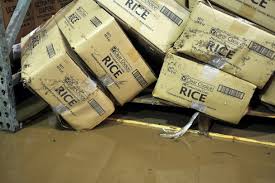Spring is coming and it always seems that we have large floods somewhere. So what happens to your food storage if your home or basement floods and your food is exposed to flood water? Not a good situation but at least a part of your food storage can probably be saved.
First assume that any floodwater is contaminated, everything from chemical to fecal matter. Do not eat any fresh food that has come in contact with floodwaters.
The following types of food should be thrown out after exposure to floodwaters.
- Any opened containers and packages which have come in contact with floodwaters.
- Unopened jars and bottles with screw top lids such as those containing mayonnaise or jelly. The water will get up into the threads and you cannot decontaminate them.
- Any foods in paper, cloth, fiber, or cardboard boxes, even if the contents seem dry. This includes salt, cereals, pasta products, rice, and any sealed packages of crackers, cookies, or mixes.
- Dented seams, bulging, rusty or leaking tin cans.
- Home-canned foods, this is a bit more controversial. While water can get under the threads, you can remove the locking rings and if the seal is still good, you may be able to decontaminate the jars.
Products properly sealed in tin cans or foil pouches can be used after the container is rinsed with clean water and immersed for 15 minutes in a freshly made solution consisting of 1 tablespoon of unscented, liquid chlorine bleach per gallon of clean drinking water. Remember that chlorine bleach has a shelf life and loses its strength very rapidly. Bleach has started to lose its strength at six months. It takes about 4-8 weeks from the time chlorine bleach is made to reach your home. This leaves you 3-5 months where the bleach is at the effectiveness level stated on its label. The metal or foil containers should be completely air-dried before opening or storing. If you lack bleach, you can submerge the cans in boiling water. Watch for rust on the cans
One of the problems you would encounter is the fact that the labels would be damaged or destroyed. This would present a problem in identifying the contents of your cans. You would have food to eat, but you might have a strange menu.
We are currently looking into the idea of home canning our food in metal cans. We already have a can sealer and a large pressure canner. It is my understanding that the cans can be reused if you get the machine to re-flare them. We will be meeting with the canning expert from the Embarcadero Cannery in the near future. This would protect the foods from breakage in an earthquake and contamination from floodwaters.
Howard


Did you ever find the machine / can sealer that re-flares used cans?
I have not found one as of yet, but I have heard that they were made at one time. It has kind of slipped through the cracks, but I will be meeting with a gentleman who may know if they are available later this month. Will keep you posted.
Howard